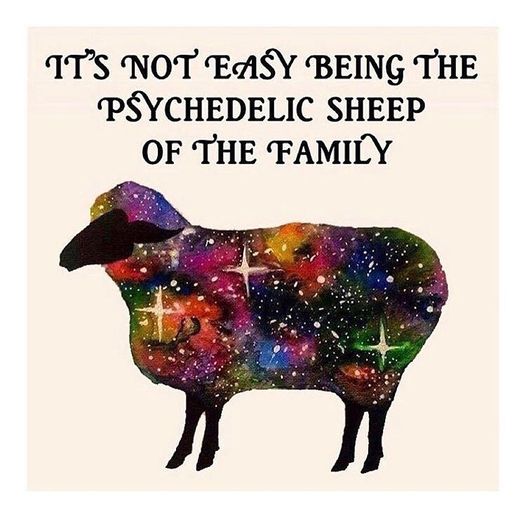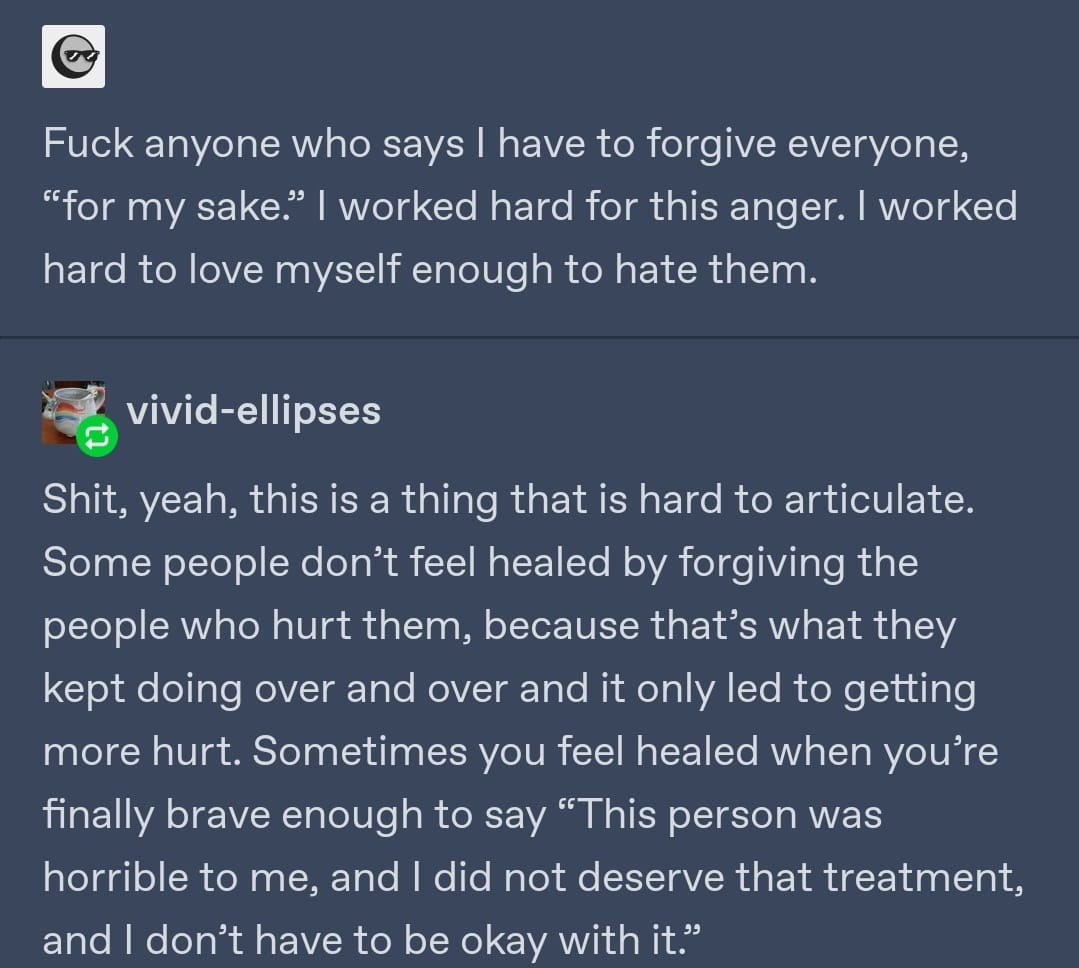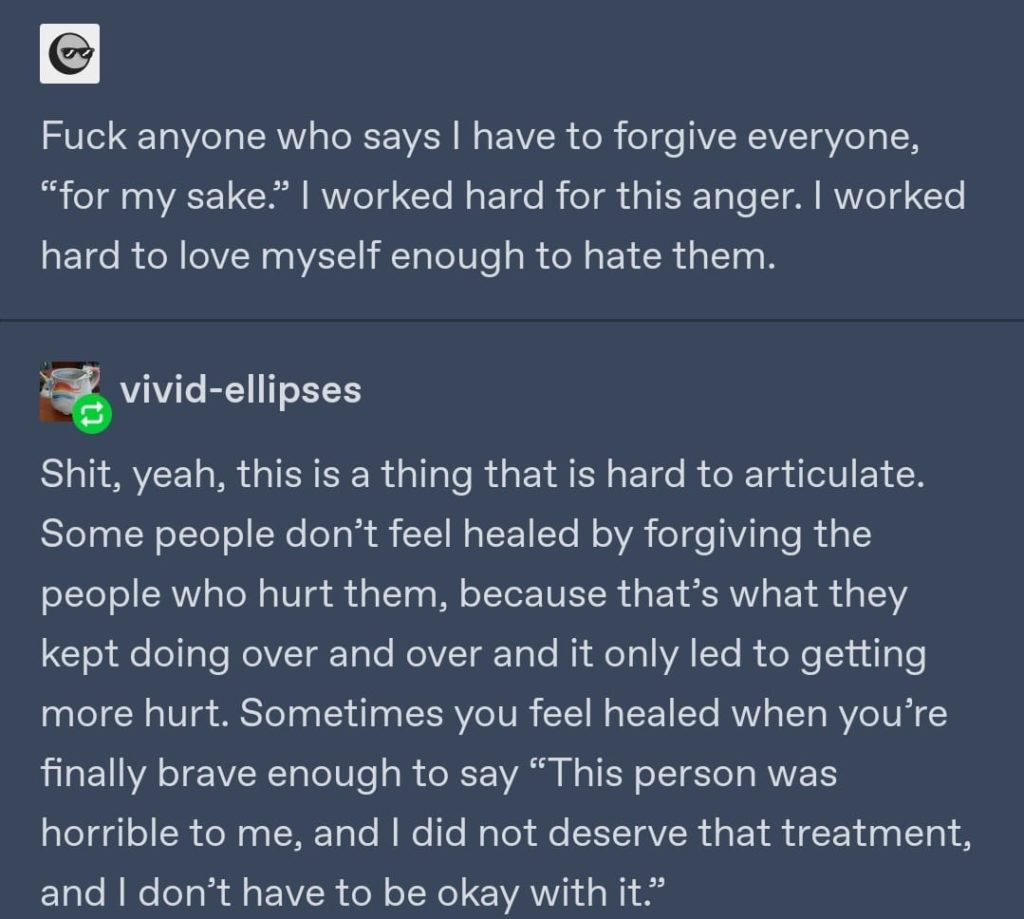It would be funny, if it were not so sad, to reflect on the fact that my siblings have — through their actions, as well as their inaction — proven me to be right about all this shit. Inadvertently, I’m sure, but they have.
If you think about what might have happened instead, in a normal, healthy, functional family, it’s obvious.
Just for starters, take how this all started — or rather, the crisis that precipitated me figuring out what was really going on in this dysfunctional collection of siblings:
Upon finding out that I was upset about the disrespectful way Susan acted towards me when my/our dad died — specifically, her ignoring my reasonable request that, if she and the hospice nurse were going to continue their casual, shop-talk, LAUGHING conversation, could they please do it in a room other than the one with his still-warm body shoved in the corner? — well, the normal thing to do at that point would have been for Susan to apologize — and, in the event that she resisted doing so, for my siblings, especially Joe, to make sure that happened.
The hospice nurse did apologize. She wrote me a sincere, heartfelt card. This is the appropriate level of contact for someone who is virtually a stranger. It’s simple, basic politeness.
Susan also wrote me a card. That in itself is telling. She didn’t talk to me the next day, nor did Joe (they yelled AT me, but they sure as hell didn’t talk, let alone LISTEN). Nor did they call me later. There were emails between Joe and me (and probably shared beyond that, without my knowledge, but that’s just par-for-the-course disrespect for me, hardly worth mentioning) — but as for Susan and me, we’ve actually never talked about it.
I assume that is because it would be far harder to avoid apologizing in an actual conversation than in a very carefully written piece of bullshit that attempted to pretend that she didn’t know how upset I was, and to share the blame for the incident equally, claiming that I didn’t know how upset SHE was.
Well, no, I didn’t. That’s because 1) she had only known him a few years, as opposed to her whole entire life; and 2) SHE WAS LAUGHING.
The next abnormal thing that would not have happened in a normal family was everyone blaming me for being upset about it. Because what she did was SO FUCKING EGREGIOUSLY AWFUL THOUGHTLESS RUDE BEHAVIOR that it’s kind of insane that anyone can say that Susan’s behavior was fine, and mine was not: for politely asking her to leave the room, which she and Joe graciously agreed that night to “overlook”, bless them — and for the apparently truly unforgivable sin of bringing it up the next day, just to Joe — not knowing that Susan was around the corner, and came into the room like a screaming banshee.
This isn’t even taking into account that she was clearly not invited to be part of that conversation, and she should have not have been eavesdropping, nor should she have butted in, even if she overheard accidentally. The adult, respectful thing to do would have been to go away, where she could not overhear, and let Joe and me talk.
Or just possibly, apologize for eavesdropping, acknowledge that I was clearly still upset by her behavior the night before, apologize for that, and then either go away, or join the conversation if invited to do so.
Or for Joe to tell her to please leave the room, or for him to drag me and our conversation outside or elsewhere in order to have some privacy, or… the point is made, the possibilities are numerous. And none of them happened.
Because it was ME confronting JOE — like we were equals, can you imagine the NERVE! — it became okay, probably imperative, for her to attack me for it. Screaming inches from my face, just hours after my father died. This was not only allowed to happen, in front of my brother — he joined in. Until, with my husband, I finally fled the house.
To my knowledge, no one has ever held her or them accountable for that bullshit behavior, either.
The next normal thing that should have happened is that when my oldest brother tried to talk to me about what happened, he should probably have figured out that he was getting an earful of only one side of the story — because he started telling me how I should have approached that next-day discussion (I should have approached Joe on his own) and I remember yelling at him THAT’S EXACTLY WHAT I DID.
But beyond that, what I realized later was that he was only “listening” to me because he was desperately looking for a way to interpret my actions in a way that would allow him to BLAME ME, in order to avoid holding Susan responsible, and by extension, Joe.
And this was really, really difficult, because my actions were in fact not the issue, and again, it’s pretty insane for anyone to try to justify what Susan did. Hell, the best even Susan herself could do was to imply the blame should be equal.
But, this is classic behavior for a dysfunctional family with a handy scapegoat. Find a way to blame them, and it doesn’t actually have to make sense.
Another normal thing that might have happened, but didn’t: the secondary black sheep brother once told me that he too was upset and annoyed at Susan’s behavior that night, and he was almost ready to speak up himself, but I beat him to the punch. He could have spoken up as well, and backed me up, that night. That would have been normal.
But he decided to stay silent, at that point and apparently forever after, rather than voice his agreement with me. In all the ugly aftermath, he just let me take the fall.
Such is the very strong taboo against sticking up for me, in this collection of wounded, dysfunctional siblings.
More normal family behavior: if, at any time over the past dozen years, any sibling, or even in-law, had felt sorrow over my estrangement from them, they could have expressed it as such. They could have called or emailed or texted or sent a card that said they missed me. That they were sorry about all that had happened when Dad died. That they would like to talk, or even more appropriately, listen. That they were willing to start over, as adults, and try to build a new relationship, on whatever terms I could accept.
Needless to say, the calls, texts, emails, and cards that I did receive were not of this nature.
I ended up blocking just about every mode of communication I could — which of course was seen not as a failure of theirs to meet my relatively basic conditions to have a relationship with them, not as their refusal to treat me at least as well as they would treat a stranger — but as proof that I was unreasonably rejecting them.
As has been stated before, I was not rejecting them — I was rejecting the way they treated me. I was always willing to have a relationship with anyone who had the guts to reach out in an adult, respectful, honest way.
No one ever tried that. Maybe once or twice, early on, but the one person I can think of who did, probably got pressured into quitting that radical behavior in order to be allowed to fully join the club.
They will claim, as an excuse, that I “told them not to contact me”. Which is, technically, true, but only as far as it goes. What is more accurate — the whole truth — is that I told them not to contact me unless they were willing to treat me differently. With respect, as an equal. And clearly, they aren’t.
Another abnormal thing that happened was that my sister FORBADE ANYONE IN HER FAMILY TO DO THAT, and possibly that prohibition extends to all the siblings. I realized that when her husband tried to meet with us once, but he said it would have to be in another city because he couldn’t fly to our location, and I realized this was because my sister must have actively forbidden any contact with us.
I appreciated his willingness to try to resolve things between us, but unfortunately I believe he was hoping to work with the reasonable person, because of the impossibility of working with the unreasonable one.
The last abnormal thing I’m going to write about — far from the last one that’s happened — is that when the news of my diagnosis of terminal, stage IV triple negative breast cancer reached them, it might well have caused some people to re-evaluate their actions and inaction and reactions, what they’ve done, how they think about me, what they blame me for, and maybe try to make amends before it’s too late — but that’s clearly not the case, either.
Word has gotten back to me that my sister’s response to the news of my TERMINAL CANCER DIAGNOSIS was something like,
“That’s HER problem. She ruined my senior year.”
OF HIGH SCHOOL.
Pathologically, not to say pathetically, abnormal.
And I hate to break it to you, sis, but you’re wrong.
It’s Mom & Dad who did that — not me. They failed you — not me.
Hope you’re happy having lived your whole life taking all that out on me.
I know I’m not. And I know that doesn’t bother you in the slightest, good Catholic girl though you are, or pretend to be.
I didn’t deserve that. None of us deserved the trauma and dysfunction we got, but boy, you really put your heart into punishing me for it all.
If only she had gotten some therapy after that stressful year…
If only she had been able to vent her rage and frustration appropriately…
But the damage is done.





